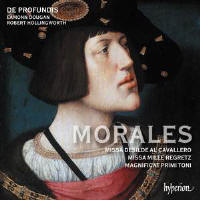Texte paru dans: / Appeared in: |
|
|
Outil de traduction |
|
|
Analyste: J. F. Weber
This generous program gives us two of Morales’s Masses with the songs that gave them their cantus firmi and one of his settings of the canticle Magnificat. Cristóbal de Morales (c. 1500–1553) wrote 22 Masses (or 24, as listed in The New Grove), at least nine of them recorded. Missa Mille regretz, the most familiar, has had at least five previous recordings (Miroslav Venhoda on Valois in 1969, Paul Hillier on Almaviva in 1991, Chanticleer on their own label in 1993, Victor Alonso on Accord in 1994, and Paul McCreesh on Archiv in 1995, Fanfare 20:2), but this is the first recording of Missa Desilde al cavallero. Morales is best known for 18 settings of the canticle Magnificat, of which at least five have been recorded. The present recording of the Magnificat primi toni apparently duplicates Stephen Rice’s recording (32:3) of all 12 verses in polyphony, as Morales composed it. He published it that way in 1542, then three years later he published the settings in all eight modes as two alternatim settings for each, one for odd verses, the other for even verses. Morales composed some early Masses in Spain, then others later in Rome for the Sistine Chapel. Six Masses use cantus firmi (mostly Gregorian chants), and eight Masses are parodies, mostly of secular songs. He published two books of Masses in Rome in 1544. The first book included Missa L’homme armé à 5 (recorded by Alejandro Planchart in 1973 and Alistair Dixon in 29:1); Missa Mille regretz à 6, noted above; Missa Quaeramus cum pastoribus à 5 (Ireneu Segarra in 1962, James O’Donnell in 17:3, and Rory McCleery in 38:4); Missa Si bona suscepimus à 6, called “his most substantial composition” (Peter Philips in 24:4); and Missa Vulnerasti cor meum à 4 (Michael Noone in 2008). The second book included Missa Benedicta est regina caelorum à 4 (recorded by Michael Noone in 2000), Missa Ave Maria, recorded by Lionheart (without a Credo) in 2006 (31:1), Missa de Beata Virgine à 5 (Michael Noone in 1996, Joel Suhubiette in 34:1, and Ensemble Jachet de Mantoue in 2006); Missa pro Defunctis à 5 (Wolfgang Schäfer in 13:3, Jordi Savall in 16:4, Paul McCreesh in 22:2, Guy Janssens in 30:4, and Raúl Mallavibarrena in 38:5). Among several Masses not published that year, Missa Desilde al cavallero à 4 is an early work found only in a Milan manuscript. While Peter Philips called the Mass he recorded Morales’s “most substantial composition,” the other six-voice Mass, recorded here, may fairly claim a similar position. An early work, possibly written as a gift for Emperor Charles V (who was fond of the underlying song), Morales copied it into a Vatican manuscript between 1535 and 1537. When it was printed in 1544 in the first book, he revised the Sanctus and Agnus Dei I and III. The printed version is sung here, followed by the 1535–37 movements. One word in the track list is puzzling: the second group of movements is called “the first printed edition,” though the notes refer only to a manuscript copied at that time. Since Morales copied his early Masses for the Sistine chapel and then copied his Roman Masses when he returned to Spain, he seemed to show no preference for a cappella performance (as in Rome) over organ accompaniment (as in Spain). Therefore, the ensemble plans to record each pair of Masses (on CD) as they do here, Missa Mille regretz a cappella, the other with organ. This is the fourth CD that this vocal ensemble (made up of 19 men this time) has given us, following Ribera (40:2), Vivanco (42:1), and Esquivel (43:6). Morales is the earliest of the four late-Renaissance Spanish composers and the most well known. Eamonn Dougan directed the Missa Desilde al cavallero, Robert Hollingworth all the other works. The good news is that this is the first of 12 CDs that will offer all of Morales’s Masses and Magnificats. This program suggests that each CD may offer a familiar Mass coupled with a first recording of another Mass, filled out with Magnificat settings. The large male vocal ensemble produces a rich, well-blended tone. (It may be noted that two other vocal ensembles of about the same size are the Brabant Ensemble and The Sixteen, but both are adult mixed-voice groups.) The ensemble is easily their equal, and Hyperion is giving us a valuable series of recordings. Go for this one, and you will probably be watching for the rest of the series.
|
|




